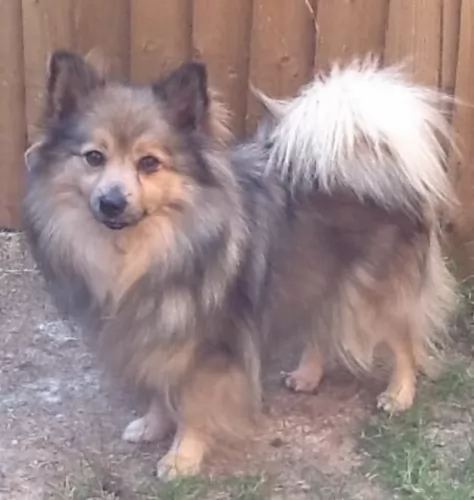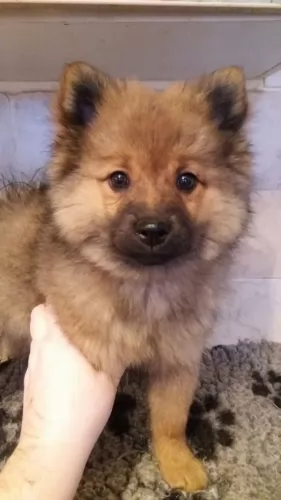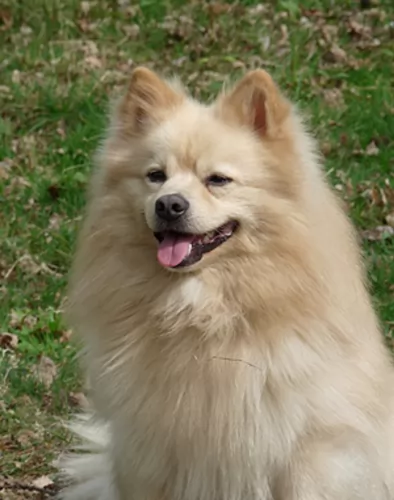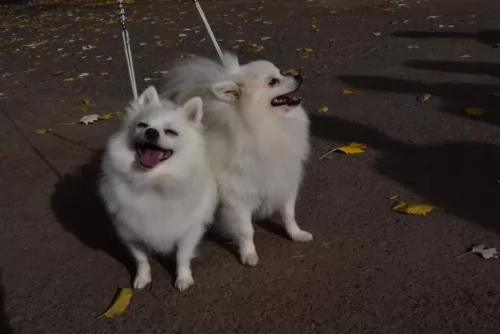 Petzlover
Petzlover German Spitz (Mittel) is originated from Germany but Pyrenean Mastiff is originated from Spain. German Spitz (Mittel) may grow 44 cm / 17 inches shorter than Pyrenean Mastiff. German Spitz (Mittel) may weigh 89 kg / 196 pounds lesser than Pyrenean Mastiff. Both German Spitz (Mittel) and Pyrenean Mastiff has almost same life span. German Spitz (Mittel) may have less litter size than Pyrenean Mastiff. German Spitz (Mittel) requires Moderate Maintenance. But Pyrenean Mastiff requires Low Maintenance
German Spitz (Mittel) is originated from Germany but Pyrenean Mastiff is originated from Spain. German Spitz (Mittel) may grow 44 cm / 17 inches shorter than Pyrenean Mastiff. German Spitz (Mittel) may weigh 89 kg / 196 pounds lesser than Pyrenean Mastiff. Both German Spitz (Mittel) and Pyrenean Mastiff has almost same life span. German Spitz (Mittel) may have less litter size than Pyrenean Mastiff. German Spitz (Mittel) requires Moderate Maintenance. But Pyrenean Mastiff requires Low Maintenance
 Originating in Germany, the German Spitz Mittel is an alert, vigilant dog and it is these qualities that made him sought after for working on farms.
Originating in Germany, the German Spitz Mittel is an alert, vigilant dog and it is these qualities that made him sought after for working on farms.
He is no new breed and is the 3rd largest of the five German Spitz varieties. It is believed that the German Spitz descended from the Northern sled and herding dogs which arrived with the Vikings into Europe. When you do research you see that the dogs are mentioned in German literature which dates way back to to 1450 already.
 The Pyrenean Mastiff originates from Spain, descending from ancient livestock guardian-type dogs.
The Pyrenean Mastiff originates from Spain, descending from ancient livestock guardian-type dogs.
They have always been used as guardians, looking out for livestock and warding off predators.
When you do research you find that there is little information on the exact origins of the dog. It was only in recent years that the dog was taken out of its native region and sent to the USA, but it isn’t recognized by the AKC.
The dog was however recognized by the FCI in 1982.
 The German Spitz Mittel is similar in looks to the other sizes of German Spitz. The Mittel is a medium sized dog and stands between 30 and 38cm in height and weighs between 7 and 11kg. You’ll find him in solid colors such as tan, liver, white, fawn, black or a mix of these colors.
The German Spitz Mittel is similar in looks to the other sizes of German Spitz. The Mittel is a medium sized dog and stands between 30 and 38cm in height and weighs between 7 and 11kg. You’ll find him in solid colors such as tan, liver, white, fawn, black or a mix of these colors.
He has a soft woolly undercoat and a long outercoat with a mane-like ruff at the neck. He has a fairly long muzzle, dark eyes, sharp erect ears and a bushy tail which curls over his back.
Affectionate, faithful, and always happy by nature, the German Spitz Mittel is a family companion that wants to be part of everything his human family is up to. He makes a good watchdog. He is alert and has a distrust of strangers.
He gets on well with children in the home and he can also live in peace with other dogs. Because he is an intelligent dog, you won’t have much trouble with training- and socializing him, although he will require a firm, consistent owner and trainer.
Training and socialization are important as there are always some important commands such as sit, stay, come and lie down that you will want him to respond to immediately.
 This is a beautiful big dog, strong and muscular. He stands at between 75 and 82cm in height and weighs between 70 and 100kg, males and females.
This is a beautiful big dog, strong and muscular. He stands at between 75 and 82cm in height and weighs between 70 and 100kg, males and females.
He has a thick double coat which is fairly long and which also sheds regularly. The coat is essentially white in color with large markings of reddish brown, tan, grey or black.
The Pyrenean Mastiff has a large head with a black nose, small, dark eyes, floppy, medium sized ears and a long tail with lush hair growth.
Large he may be, but the Pyrenean Mastiff is a docile dog that gets on well with children as well as with other pets. He is intelligent but also strong willed and independent, making him a little bit difficult to handle if he chooses to ignore your commands.
Training and socialization will be required if you want him to be obedient and well mannered. He can do well with you as a novice pet owner, so long as you are firm, consistent, kind, patient and fair in your handling of the Pyrenean Mastiff.
Even with socialization, he tends to be wary around strangers and becomes quite protective around his human family.
He is a calm dog that doesn’t require a whole lot of exercise, but he isn’t suited to life on a small property in the city as he needs a lot of space to feel content and at ease.
 People who have owned a German Spitz Mittel are delighted with him, saying that he is such an easy-going, happy dog. He is social and thrives on the interaction he has with his human family.
People who have owned a German Spitz Mittel are delighted with him, saying that he is such an easy-going, happy dog. He is social and thrives on the interaction he has with his human family.
He won’t do well if you simply put him in your backyard and forget about him, using him merely as a watchdog.
The German Spitz Mittel dog is one dog that definitely lives up to the title of man’s best friend. He is social, happy, loving, loyal, playful, entertaining and smart too, and when you treat him the way he deserves, you’ve got the most awesome friend.
 These beautiful dogs have always been extraordinary guarding dogs, but he has some other excellent characteristics that make him such a great companion.
These beautiful dogs have always been extraordinary guarding dogs, but he has some other excellent characteristics that make him such a great companion.
He is a loyal, loving dog and easy to train.
You just have to think twice before you take such a large dog into your home, as he doesn’t like to be cooped up in small spaces. He will also eat a lot too.
You want to know that you can provide the Pyrenean Mastiff with all these things. If you have the means to keep such a large pet, then he will make you a splendid canine companion.
 German Spitz dogs are healthy, and when you shower him with love and attention and good food, you can expect to have him around for up to 15 years of age.
German Spitz dogs are healthy, and when you shower him with love and attention and good food, you can expect to have him around for up to 15 years of age.
Of course, as with any other healthy dog breeds, there are always one or two common dog illnesses that your dog may get. These include hip dysplasia and eye diseases. If you notice symptoms that indicate possible joint issues with your pet, get him to the vet immediately.
Patellar Luxation for instance occurs when your dog’s kneecap is dislocated. It is more common in toy breeds like the German Spitz. It can be painful for your pet and lead to lameness. If your dog has problems with his hip, it can actually force the patella out of its groove, which is a secondary condition.
 This is a fairly healthy dog breed, particularly when you consider what a big dog he is. There are always some health concerns to watch for so that you can take steps to get your pet well again.
This is a fairly healthy dog breed, particularly when you consider what a big dog he is. There are always some health concerns to watch for so that you can take steps to get your pet well again.
There is tartar build-up on the teeth and this can lead to infection of the gums and roots of the teeth. Rotting teeth can cause pain, but more worrisome they can cause damage to the heart and kidneys as well as the dog's joints. The vet or professional pet groomers can keep your pet’s teeth clean. They can advise you on how to take care of your large pet’s teeth.
Diseases such as rabies and parvo can be prevented by means of vaccine.
You can’t afford for a big dog like this to become obese. It’s a serious disease and can put pressure on your dog’s joints and also cause back pain and digestive disorders.
Your dog can be infected with all kinds of worms and bugs such as ticks d and fleas as well as mites. Some of these parasites can be transmitted to you. Your vet can talk about preventive medication.
Gastric Dilatation and Volvulus, commonly referred to as bloat often occurs in dogs with deep chests.
The stomach twists and fills with gas,and blood to the stomach is cut off. Left unattended to, your dog can die, sometimes within half an hour. His stomach is hard and swollen, requiring immediate veterinary attention.
 You can help reduce loose hairs with your German Spitz by brushing his thick coat twice a week. It’s a good time to also inspect your dog for ticks and fleas.
You can help reduce loose hairs with your German Spitz by brushing his thick coat twice a week. It’s a good time to also inspect your dog for ticks and fleas.
Your German Spitz Mittel isn’t the most active dog, but he will still need regular exercise. Going on a walk is good for both you and him. He is a mentally sharp dog too and these walks keep him both physically- and mentally fit. He also loves ball games.
Every dog deserves the best food, and if you feed your German Spitz Mittel with a commercially manufactured dog food, make sure its one of the top quality ones. You want to avoid foods packed with preservatives, colorants and fillers. You want dog foods with minerals and vitamins with high protein and ingredients such as Omega 3 and 6 to promote health skin.
There are also some dog foods which have ingredients in them such as polyphosphates. Ingredients like this keep your dog’s teeth clean.
Try and also give him some cooked rice, vegetables and chicken mixed into his kibble from time to time as well as raw meat. He should never be without fresh, cool water.
 Have your pet spayed or neutered if you don’t want puppies. Spaying or neutering also decreases the likelihood of certain types of cancers.
Have your pet spayed or neutered if you don’t want puppies. Spaying or neutering also decreases the likelihood of certain types of cancers.
Nothing but a top quality diet is good enough for your pet. Commercially manufactured dog foods are a convenient means to feed your pet, and there are some excellent brands.
Look out for the ones for extra large dogs and avoid the ones with low quality ingredients. The dry kibble you give your big pet can be made more tasty when you add some homemade food to it about twice a week.
Dogs thrive on simplicity, so boiled chicken, sweet potatoes, brown rice or pasta, carrots and spinach will be wonderful for him when you chop the food up and add it into the dry kibble. Its such a tasty, wholesome treat for your pet.
Some raw meat added in occasionally will contribute to your pet’s heath. Make sure he is never without a constant supply of fresh, cool water.
Brush his coat at least twice a week. Check inside his ears for redness which could indicate an ear infection.
He’s an intelligent pet with lots of energy, so you will need to keep his mind and body active by ensuring he enjoys walks every day. He isn’t a dog that requires running with you on your jogs or cycles.